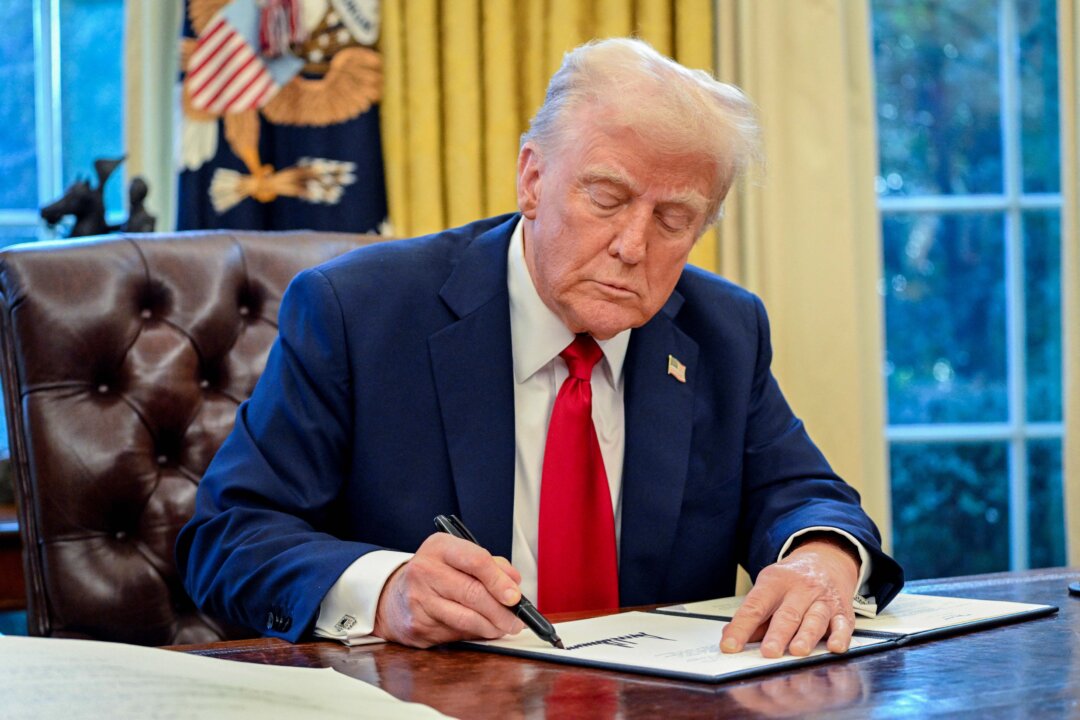The fund, which could include funds from a potential TikTok sale, will be created in the next 12 months.
President Donald Trump signed an executive order on Feb. 3 ordering the creation of a sovereign wealth fund to “promote the long-term financial health and international leadership of the United States.”
“We have tremendous potential,” Trump told reporters in the Oval Office of the U.S. economy during the signing of the order. The president said Treasury Secretary Scott Bessent and Howard Lutnick, his nominee for commerce secretary, will lead the effort.
Bessent, who was present alongside Lutnick at the signing, stated that the fund is expected to be operational within the next 12 months.
“We’re going to monetize the asset side of the U.S. balance sheet for the American people, we’re going to put the assets to work,” Bessent said at the signing. “We’re going to study best practices that’s done around the world. It’ll be a combination of liquid assets, assets that we have in this country as we work to bring them out for the American people.
“I think it’s going to create value and be of great strategic importance.”
A sovereign wealth fund is a government-owned investment fund, typically funded by a country’s surplus reserves or revenue from natural resources. These funds are often used to support national economic goals and can function like venture capital by investing in various sectors. Notable examples of sovereign wealth funds include those in Abu Dhabi, China, Hong Kong, Norway, Qatar, and Singapore.
“So other countries have sovereign wealth funds, and they’re much smaller countries, and they’re not the United States,” Trump said. “We have tremendous potential in this country, tremendous. That’s what has happened just in a short period of time.”
Trump pointed to a potential sale of TikTok as an example of what could go into the sovereign wealth fund.
“If we make the right deal … we might put that in the sovereign wealth fund, whatever we make,” he said. “Or if we do a partnership with very wealthy people … a lot of options.
“We have a lot of other things that we could put in the fund, and I think in a short period of time, we’d have one of the biggest funds.”
Trump is currently encouraging negotiations between U.S.-based investors and the China-based company ByteDance and the Chinese regime for the potential sale of the Chinese social media app TikTok.
On his first day in office, Trump issued an executive order to pause the ban on TikTok for 75 days to allow the administration time to review possible next steps with regard to national security risks posed by the China-linked video-sharing platform.
According to a federal law enacted in April 2024, TikTok faces a ban in the United States if it doesn’t separate from its Beijing-based parent company, ByteDance.
“I guess I have a warm spot for TikTok that I didn’t have originally,” Trump said as he signed the executive order on Jan. 20, crediting TikTok, a platform with tens of millions of young users, with helping him win over young voters in the 2024 election.
He indicated in the order that he wanted to find a solution “that protects national security while saving a platform used by 170 million Americans.”
He suggested a deal in which the United States government would hold a 50 percent stake in TikTok, saying such a deal “will make it very worthwhile for [ByteDance] in terms of the permits and everything else.”
“So what I am thinking about saying to somebody is, ‘Buy it and give half to the United States of America, and we’ll give you the permit,’ and they’ll have a great partner,” Trump said, adding that it was a good deal for ByteDance, as without a permit to operate in the United States, TikTok’s market value would take a significant hit.
On Jan. 27, Trump said that Microsoft was one of the companies interested in buying TikTok. He added that there has been “a lot of interest in TikTok” but did not offer details about other companies interested in purchasing it.
Other names who have expressed interest are prominent YouTuber Jimmy Donaldson, known as MrBeast, and former U.S. Treasury Secretary Steven Mnuchin, although Mnuchin said he had paused his bid as China was unwilling to negotiate the sale of the technology that has made TikTok so successful.
ByteDance has not yet indicated whether it will sell TikTok. The Chinese foreign ministry has said that companies should be allowed to make their own decisions on their operations and acquisitions but that “if it involves Chinese companies, China’s laws and regulations should be observed.”
Beijing’s recent technology export restrictions would complicate any decision by ByteDance to sell.
The dynamics of private business in China are complex, as ByteDance, as long as it is operating under the legal and political framework of the ruling Chinese Communist Party (CCP), ultimately remains subject to Chinese laws and could be compelled to cooperate with state directives regardless of company ownership or shareholder composition.
By law, Chinese companies are required to set up CCP units within their offices to ensure that business policies and employees toe the Party line. ByteDance, founded in March 2012, set up its Party committee in October 2014.
Over the years, Chinese state-owned media outlets have explicitly cited TikTok as a tool for advancing the regime’s goals, John Garnaut, a senior fellow at the Australian Strategic Policy Institute think tank, testified to the House Select Committee on the CCP in November 2023.
ByteDance hasn’t responded to The Epoch Times’ multiple requests for comment.
Melanie Sun and Terri Wu contributed to this report.

